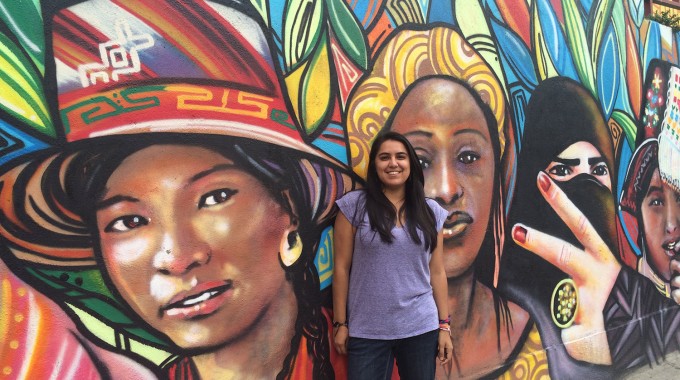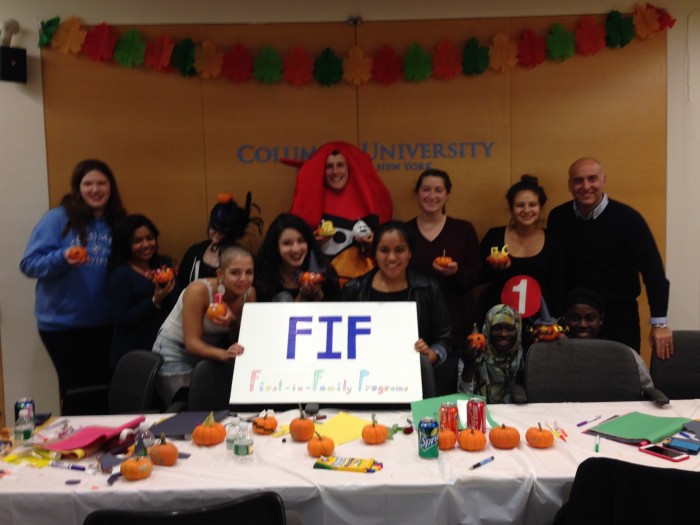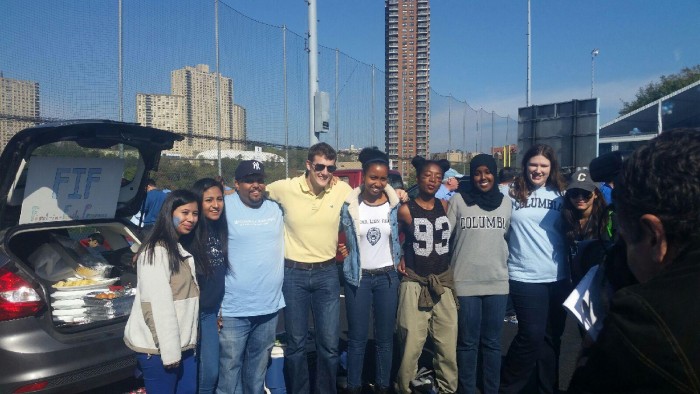If you know of a Columbia College student, faculty member, alumnus/alumna or program we should spotlight, or if you would like to submit a story, please contact:
Columbia College
Office of Communications
cc-comms@columbia.edu

“If my involvement in the First-Gen Brunch Series can help at least one family and their student navigate the cultural and linguistic barriers ... then I’m all the more proud for having been a part of it.” — Genesis Sanchez CC’15
For Genesis Sanchez CC’15, the first person in her family to attend college, the transition to Columbia brought many unique challenges. During the 2013-2014 academic year, Genesis was one of six first-in-family students who participated in the Center for Student Advising’s (CSA) First Generation Brunches, a new initiative led by Senior Assistant Dean Alex España that brought students together for monthly conversations about the unique experiences that first-in-family students face as undergraduates. Here, Genesis reflects on her experience as a first-generation student and her role in bringing to fruition the CSA’s newest first-in-family initiatives, including a Columbia 101 conducted in Spanish during the summer of 2014; a First-in-Family welcome reception and panel for students and their families during the 2014 Family Orientation before New Student Orientation Program; a first-in-family support group in collaboration with the Center for Psychological Services; workshops on topics such as study skills, connecting with faculty and study abroad; outings and events to connect first-in-family students with each other and with first-in-family alumni; and a peer-mentoring program for first-generation students coordinated by Christopher Zombik CC’14, who also took part in the First Generation Brunches.
I’ve always known that I was going to go to college.
I grew up in a largely immigrant, low-income neighborhood, where even graduating from high school was seen as an accomplishment and not a given. My parents, Mexican immigrants who migrated to the United States as teenagers, barely finished the Mexican equivalent of middle school. Once in the U.S., my parents began working to support themselves and their respective families. They always tried to teach and instill in my brothers and me the value and necessity of education. Even so, the odds of going to college, let alone an Ivy League institution, felt stacked against me.
The fact that I ended up at Columbia was no small feat, but it was a challenge that I thought I was prepared for. Though I knew that I hadn’t attended great schools, I tested well and was always ranked at the top of my class. But even though I looked like many of my future Columbia peers on paper, I would come to realize that I was not prepared for the reality of what it would mean to be a first-generation, low-income student at Columbia.
 First-in-Family students and staff. Photo: Courtesy CSA
First-in-Family students and staff. Photo: Courtesy CSA
This was why I gladly agreed when, in the fall of 2013, Alex España, senior assistant dean in the Center for Student Advising, asked me, along with five other first-generation students, to join a series of brunches that were a part of a new initiative within the Center for Student Advising (CSA). The “First-Gen Brunches,” as we referred to them, were a series of monthly conversations with Dean España meant to shed some light on the myriad experiences that first-in-family students face at Columbia. We hoped that our discussions would help the CSA develop useful programs to advise and guide first-generation students.
First-generation students come from very diverse backgrounds, making us a complicated group of students to develop programming for. And although our experiences aren’t the same, we all face unique challenges as we navigate spaces that are new and unfamiliar not only to us but to our families as well. Thanks to our brunches, I was able to appreciate the different experiences and perceptions of Columbia just within our group, and could contribute ideas that I felt would make a difference for other students in our community.
One of the topics I was most passionate about discussing grew out of my experience at a New Student Summer Send-Off. Every year, newly admitted students around the country are invited to these summer receptions, often hosted by alumni or parents, which welcome students and their families into the Columbia community. In retrospect, I approached this meeting with embarrassing naïveté. I pleaded with my mom to join me, even though she expressed her discomfort to me beforehand; she was afraid that with her limited English skills, she wouldn’t be able to talk to other parents and alumni.
Instead of calming my nerves about my next step, as I had hoped it would, the Send-Off made me realize that my mom and I had entered a larger community that seemed worlds removed from our reality. Neither of us could easily or comfortably mingle with the other parents or students at the meeting because we felt uncomfortable amidst language barriers, cultural differences and perceived financial disparities. I’ll never forget seeing my mom’s discomfort. And for me, that encounter sparked anxieties that I had not fully realized before. It was not just that I was about to be the first person in my family to go to college, but that I was also going to an Ivy League school in New York that was far removed from everything my family and I had ever known.
 Families at The First-in-Family NSOP 2014 Welcome Reception. Photo: Courtesy CSA
Families at The First-in-Family NSOP 2014 Welcome Reception. Photo: Courtesy CSA
When I first got to Columbia, I was lucky to develop close relationships with many of my John Jay 10 floormates. I soon realized, however, that although my friends came from a variety of diverse racial and cultural backgrounds, it seemed that many of my peers had had an extra layer of support at home and in their high schools that prepared them to tackle the rigor of Columbia — something I felt I lacked because of the high school I had attended and my parents’ educational background. When my mom called to check on me, I felt I couldn’t complain to her about schoolwork or my perceived inadequacies; at the time, it felt unfair to complain to her when I knew no one in my family could relate.
At the First-Gen Brunches, I learned that if there was a common denominator among first-generation students, it was that we were constantly struggling to bridge gaps, meet expectations and, maybe most importantly, to find space to talk about our struggles with students who could sympathize. For many first-generation students, attending Columbia means accessing opportunities our parents and families could only ever dream of. For some, it also means navigating a complicated university without a parent who understands the experience. And for others, it means having, or sometimes shying away from, difficult conversations about race, class and privilege. But above all else, at the First-Gen Brunches we realized that being labeled “first-generation” felt stigmatizing and shameful, and we knew that it shouldn’t.
In my first two years at Columbia, I struggled to manage the anxieties that I now know are typical for first-generation students — struggles that eventually led to my taking a year off. I was always acutely aware of racial, cultural, educational and economic differences around me. Columbia offered me — and continues to offer — a generous financial aid package, but I still felt like a burden to my parents when it came time to pay what little tuition was left.
At the same time, I also struggled academically. It became obvious to me very quickly that my high school had done little to prepare me for college. I picked classes without much thought or guidance because I was wary of consulting peers and advisers for fear of appearing uneducated. I constantly underestimated how long a reading or an assignment would take me. When advisers and professors recommended getting a tutor, I declined. I didn't want anyone to know I was struggling with school.
Then, in the summer of 2012, I began an internship at the CSA. I was hired as a residential adviser for Columbia’s Academic Success Program (ASP), a program that provides educational, emotional and institutional support for incoming students — many of whom identify as first-generation, low-income or both — to succeed at Columbia.
 First-in-Family students and staff at the First in Family Homecoming Tailgate. Photo: Courtesy CSA
First-in-Family students and staff at the First in Family Homecoming Tailgate. Photo: Courtesy CSA
It was through this internship that I realized that the difficulties I had faced at Columbia were not necessarily my fault; with the proper support, students like me could thrive at Columbia. Even so, a few of my ASP students had a hard time and, like me, wound up taking time off from their undergraduate studies. For two years I had struggled by myself, only to realize that other students from similar backgrounds did exist at Columbia. The First-Gen Brunches, which began a year later, were additional proof: I was not alone.
If there’s anything that the Brunch Series reinforced for me, it is that my identity as a first-generation student is not something I should shy away from. Students should feel proud about such an accomplishment and be able to find support from their peers, advisors and the University when they need it. The First-Gen Brunches were a way for us, as first-generation students, to begin honest and open conversations about what that support could look like for the growing first-in-family population at Columbia.
Several ideas emerged during the brunches and were subsequently implemented. During NSOP 2014, CSA hosted a “First-in-Family” welcome reception and panel for students and their families. One of my peers in the Brunch Series, Christopher Zombik CC’14, now works for Columbia as a program coordinator at CSA, and has launched a peer-mentoring program for first-generation students. Dean España is also working with Counseling and Psychological Services to create a support group for this unique group of students. Additionally, this summer, the College and Fu Foundation School of Engineering and Applied Science conducted a Columbia 101 entirely in Spanish for the parents and families of Spanish-speaking students.
This last initiative is particularly important for me, as I think back to that New Student Send-Off the summer before my first year, when my mom felt embarrassed that she was not able to navigate conversations with other parents and alumni because of a language barrier. If my involvement in the First-Gen Brunch Series can help at least one family and their student navigate the cultural and linguistic barriers that my mom and I weren’t able to four years ago, then I’m all the more proud for having been a part of it.
Genesis Sanchez CC’15 is majoring in Race and Ethnicity Studies with a focus on Latino Studies, and concentrating in Latin American and Caribbean Studies. She spent the Fall 2014 semester traveling and studying abroad in Bolivia. This story appeared in the 2013–2014 Columbia College Annual Report.